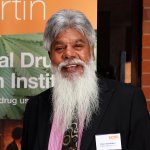This weekend I will... catch up with some of my kulunga (children). I visit my kulunga to also enjoy the company of my grandchildren, and to keep up to date with the world. I'm looking forward to winter sports starting soon, as I'll be able to watch my sons and grandchildren in action. I love Aussie Rules and have a granddaughter playing against the boys so “bring it on”!
I wish I'd never... agreed to be on so many committees (so much to do, so little time); but then again I would get bored!
I'd originally planned to work... in culture and Aboriginal land rights. I had completed studies in this area but was snapped up to work in education and health. Nevertheless these two areas of work are important in developing quality of life and therefore culture. As a young man I made a conscious decision that I would help build healthy Aboriginal people to be able to look after the land.
The qualities I most value in my colleagues are... their honesty and integrity. The researchers and administration staff here at NDRI are supportive and understanding. We Aboriginal people are in search of a better quality of life and need assistance to do so. I remind non-Aboriginal Australians: please don’t discriminate against or patronise us. The paternal system of past eras has left us depleted and insecure. We need this generation and those following to begin to properly enjoy our cultural diversity. Australia is a great place to live for most of us; let us strive to make this so for all Australians.
I'll never forget... the time I got to sing “From little things big things grow” with the Wolverine (Hugh Jackman) at the 20-20 Summit in Canberra in 2008. By pure chance, out of over 1000 seats, I sat next to one with a reserved sign on it. WOW! Hugh Jackman sat in the reserved seat with his roving mike, and after singing with me spoke to other delegates at the Summit.
If I had more time, I'd... spend much more time in the bush. I was brought up in the country, and moving from the bush to the city leaves a mix of emotions. I need to travel to the country to visit relatives, visit sites and go hunting and fishing. I catch Parndi (black bream) and other fish in the Derbarl Yerrigan (Swan River), but it is a bit hit and miss as fish, prawn and crab stocks have diminished considerably with the population growth of Perth.
I'm most scared of... small confined spaces. I am claustrophobic and I believe this is not uncommon, however it may be as a result of being locked in the smallest room in the house as a boy by my brother. I blame him for my affliction!
For my next holiday... I will simply relax. I would like to do more fun things like fishing, hunting, singing and playing music. I would also like to play golf again; I played as a younger man but this dropped off as I became more involved in my work in research.
I can't get enough of... my grandchildren. Watching them growing into young men and women is a thrill and although very demanding I thoroughly enjoy this aspect of my life.
I'm really terrible at... keeping appointments, although I do manage to keep most, and of course all those that relate to my academic work. Sometimes I ask myself why did you agree to do this? There was a story about a man who was asked to meet his Wadjella (non- Aboriginal) mate at 7.00 am to go fishing. The man failed to turn up and when asked why he simply replied, "but when I woke this morning I didn’t want to go fishing at 7.00 am". This was before mobile phones but it speaks to our different expectations of each other and our expected behaviour.
Career wise, I’m most proud of... being recognised by my peers and the broader community as having had a positive impact on the lives of Aboriginal Australians through my work. I have always maintained that if we get it right for Aboriginal Australians then we do so for poor Wadjella people as well. Much of the need in poor Australia is similar, however the history and cultural context for Aboriginal people is markedly different. I try not to get too complicated about indifference, however indifference and racism in Australia continue to make Aboriginal people sick.
My big hope for the drug and alcohol sector is... that governments do the right thing for Australia. The war on drugs is having limited impact. The AOD national harm minimisation policy is not working in Aboriginal Australia as it should. Lack of resources and lack of foresight regarding alternatives is of concern to me. We need to have a better information system that will keep governments up to date regarding drug use and trends in our population.
The sector's biggest challenge going forward is... turning research outcomes into policy. Governments are still very populist and whilst most of us accept that the liquor industry is a powerful lobby and a big part of the economy, alcohol is a big killer of Australians, and governments must do more to prevent its devastating impact. Yes, we all have a personal responsibility to look after ourselves, but some families are so disadvantaged that individuals in those families can do little to arrest the poverty that persists.











